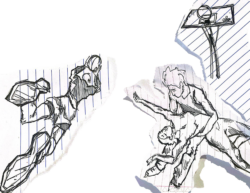For single students looking to find love, searching online is a popular option: over 50% of college students report using dating apps. Whether you swipe left or right on the idea, dating apps are ingrained in college culture. This year, two Georgetown students are working to make online dating better and safer.
Myles Slayton (CAS ’25) and Willy Conzelman (CAS ’25) created their new app, Cerca, with Carter Rocket-Munk, a senior at the University of Southern California. Cerca matches users differently than most popular dating apps: users sync their contacts and then view potential matches that they share at least one contact with. The app does not notify users’ contacts when they join the app.
Cerca has been live for two months and now hosts 10,000 to 12,000 users, creating 200 to 300 matches a day, according to Slayton and Conzelman.
“The typical dating apps, the top 10 biggest dating apps in terms of market cap, typically focus on strangers, and there’s a big issue with that. You’re seeing that in the public dating apps, because they’re all declining in growth, people aren’t happy with the product,” Slayton said. “So as opposed to focusing on strangers, ours focuses on mutuals, and the way we link mutuals is through your phone book.”
Matching with mutuals can help with the vetting process of potential matches, Slayton said, something that was missing from the dating app market. Tinder now has a Friends in Common feature that tells users if they have a mutual contact with their potential match, though it doesn’t reveal who the mutuals are. Unlike Tinder, Cerca shows its users the names of their mutual contacts.
“When you have the ability to ask your friend who’s the mutual, ‘Hey, should I go on a date with this guy? Is he normal?’ Having your best friend’s vetting process, it’s obviously a clear winner,” Slayton said.
Concerns about safety on dating apps were a major inspiration behind the idea for Cerca. Conzelman said that online dating spaces often lack regulation and safety features, which can put their users in dangerous situations. Around 8% of reported sexual assaults occur at the first in-person meeting of people who met on a dating app. Safety risks may deter some students from swiping on strangers.
Conzelman cited a story he heard from a friend as an example of safety issues on dating apps.
“One of my family friends went on three dates with a guy from a dating app, and on the fourth date, the guy invited her back to his house,” Conzelman said, “She had this weird feeling something was wrong. She saw plastic sheets on the walls, and immediately sprinted.”
Hearing about that experience and keeping his friends and family’s safety in mind motivated Conzelman to create Cerca.
“I have a sister, a mom, cousins, people I want to look out for, and they are in the market for these types of apps,” Conzelman said, “So naturally, I was kind of inclined to be a part of this.”
Aside from matches with mutuals, Cerca’s co-founders added another feature that they believe will improve the online dating scene: Cerca limits the number of profiles its users can swipe through each day. Slayton and Conzelman hope that this feature will result in users taking more time with each profile instead of rushing through.
“We want people to think really carefully with their profiles,” Slayton said. “It’s a mutual, it’s a real person, because they’re in your network. We want each profile to be really tangible, sit with it and make a decision on it.”
Cerca, being a new app, is still trying to get more users, and allowing limited swipes can ensure users have new profiles to look at everyday.
“We’re trying to build a big dating pool, and if you let people swipe as much as they want right now, they’ll quickly filter through all the profiles,” Conzelman said.
Unlike many dating apps, Cerca also prohibits screenshotting. When users swipe out of the app or try to screenshot, they will see a dark screen. Attempting to screenshot profiles more than once will result in a user being banned from the app.
“I think people want to be confident posting their photos, being themselves on the app, without feeling like people are gonna be able to screenshot and send to their friends,” Slayton said.
Slayton added that a fear of rejection also deters many people from joining dating apps, whether they fear making the first move or simply don’t know how. In response, Cerca introduced a scheduled, daily match reveal. Every evening at 8 p.m., Cerca notifies users that their matches have dropped. Announcing matches at a scheduled time rather than immediately after the second person swipes right prevents dating app users from knowing who liked whose profile first, which the co-founders hope can allow users to be confident and take a chance.
Ultimately, Cerca was designed by Hoyas, for Hoyas.
“The goal behind it, immediately, is, ‘How can we help Georgetown?’” Slayton said, “It’s a weird market for dating. It’s hard to sort of branch outside of your friend group sometimes here.”
Despite its two-month history, Slayton and Conzelman are already seeing Cerca bring people together.
“We’ve already seen a lot of successful dates, second dates, and actually people starting to put titles on their relationship, which is cool,” Conzelman said.
With Slayton and Conzelman graduating and leaving the Hilltop soon, Cerca is preparing to follow a similar evolution. In its current stages of development, the app has plenty of potential pathways, Conzelman said.
“There’s several different ways we could go,” Conzelman said. “One way is inviting people who are in relationships to match-make for their friends on the app. We’ll actually be one of the first apps, we think, to successfully do this.”
Other options include branching out from romantic relationships to platonic connections. Conzelman believes Cerca’s unique features are well-suited for facilitating friendships. Of those who use dating apps like Tinder and Hinge, 22% say a major reason they do so is to find friends.
“We expect that that number would double if we invite people to meet friends on Cerca, where you’re only meeting mutuals instead of strangers,” Conzelman said. “So that’s another feature that we’re thinking about incorporating down the line.”
Additionally, Cerca hopes to expand to other universities, starting with events at the University of Pennsylvania, Duke University, and Emory University. This summer, however, Cerca plans New York City to be the central location for user expansion. Slayton, Conzelman, and others affiliated with the app are currently planning events in New York City.
Information about upcoming events can be found on Cerca’s Instagram.
Although Cerca hasn’t been live for that long, this app is changing the game for online dating.
“It’s encouraging safety, accountability, your reputation on the line so you can’t act like an idiot,” Slayton said. “We really present ourselves as the antithesis of the typical dating app.”






interesting: https://yaledailynews.com/blog/2025/04/24/yale-student-exposes-data-leak-in-college-dating-app/
https://www.youtube.com/watch?v=TTgcNCyxJTs
Its not just “vibe coding”, its cool that what will bring IA and vibe coding is a lot of new cybersecurity jobs